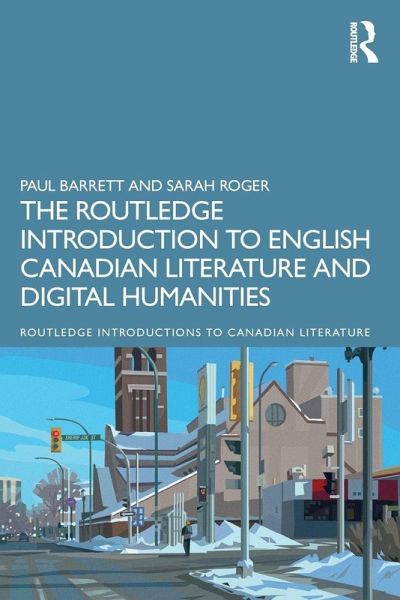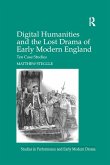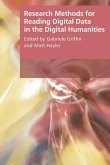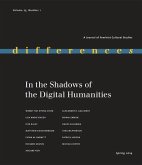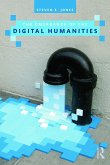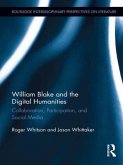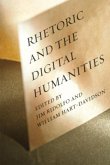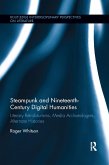Paul Barrett, Sarah Roger
The Routledge Introduction to English Canadian Literature and Digital Humanities
Paul Barrett, Sarah Roger
The Routledge Introduction to English Canadian Literature and Digital Humanities
- Broschiertes Buch
- Merkliste
- Auf die Merkliste
- Bewerten Bewerten
- Teilen
- Produkt teilen
- Produkterinnerung
- Produkterinnerung
The Routledge Introduction to English Canadian Literature and Digital Humanities is a guide to the debates, concepts, and theories at the intersection of Canadian literary studies and digital humanities.
Andere Kunden interessierten sich auch für
![Digital Humanities and the Lost Drama of Early Modern England Digital Humanities and the Lost Drama of Early Modern England]() Matthew SteggleDigital Humanities and the Lost Drama of Early Modern England67,99 €
Matthew SteggleDigital Humanities and the Lost Drama of Early Modern England67,99 €![Research Methods for Reading Digital Data in the Digital Humanities Research Methods for Reading Digital Data in the Digital Humanities]() Research Methods for Reading Digital Data in the Digital Humanities48,99 €
Research Methods for Reading Digital Data in the Digital Humanities48,99 €![In the Shadows of the Digital Humanities In the Shadows of the Digital Humanities]() In the Shadows of the Digital Humanities13,99 €
In the Shadows of the Digital Humanities13,99 €![The Emergence of the Digital Humanities The Emergence of the Digital Humanities]() Steven E. JonesThe Emergence of the Digital Humanities64,99 €
Steven E. JonesThe Emergence of the Digital Humanities64,99 €![William Blake and the Digital Humanities William Blake and the Digital Humanities]() Roger WhitsonWilliam Blake and the Digital Humanities66,99 €
Roger WhitsonWilliam Blake and the Digital Humanities66,99 €![Rhetoric and the Digital Humanities Rhetoric and the Digital Humanities]() Rhetoric and the Digital Humanities39,99 €
Rhetoric and the Digital Humanities39,99 €![Steampunk and Nineteenth-Century Digital Humanities Steampunk and Nineteenth-Century Digital Humanities]() Roger WhitsonSteampunk and Nineteenth-Century Digital Humanities67,99 €
Roger WhitsonSteampunk and Nineteenth-Century Digital Humanities67,99 €-
-
-
The Routledge Introduction to English Canadian Literature and Digital Humanities is a guide to the debates, concepts, and theories at the intersection of Canadian literary studies and digital humanities.
Hinweis: Dieser Artikel kann nur an eine deutsche Lieferadresse ausgeliefert werden.
Hinweis: Dieser Artikel kann nur an eine deutsche Lieferadresse ausgeliefert werden.
Produktdetails
- Produktdetails
- Verlag: Taylor & Francis Ltd
- Seitenzahl: 296
- Erscheinungstermin: 2. Juli 2025
- Englisch
- Abmessung: 229mm x 152mm
- ISBN-13: 9781032331256
- ISBN-10: 1032331259
- Artikelnr.: 72542103
- Herstellerkennzeichnung
- Libri GmbH
- Europaallee 1
- 36244 Bad Hersfeld
- gpsr@libri.de
- Verlag: Taylor & Francis Ltd
- Seitenzahl: 296
- Erscheinungstermin: 2. Juli 2025
- Englisch
- Abmessung: 229mm x 152mm
- ISBN-13: 9781032331256
- ISBN-10: 1032331259
- Artikelnr.: 72542103
- Herstellerkennzeichnung
- Libri GmbH
- Europaallee 1
- 36244 Bad Hersfeld
- gpsr@libri.de
Paul Barrett is an associate professor in the School of Theatre, English, and Creative Writing and the Culture and Technology Studies program at the University of Guelph. Sarah Roger is the project manager for the Linked Infrastructure for Networked Cultural Scholarship and an adjunct assistant professor in the School of Theatre, English, and Creative Writing at the University of Guelph.
Introduction: Beyond the Boundaries: Digital Humanities and Canadian
Literature
Boundaries and borderlines
Canada in DH, DH in Canada
Quickstart and contexts
Further reading
Works cited
Part I
1. What Is English Canadian Literature?
Histories of digital humanities and Canadian literature
The shape of Canadian literary criticism
New critical formations
Further reading
Works cited
2. What Are Digital Humanities?
What of the humanities?
A provisional, historical, collaborative definition
Further reading
Part II
3. Early Interventions: The History of Humanities Computing and Canadian
Literature
Early Canadian humanities computing
Emerging organization
Burgeoning humanities computing community
Towards a digital humanities
Artmob
The Orlando Project
Implementing New Knowledge Environments
A proliferation of projects
Further reading
Works cited
4. National Literatures, Infrastructural Developments: Emerging Concepts of
Canadian Literature and Digital Humanities
Humanism and the nation
Other histories
Institutional support for digital humanities
New institutional initiatives
Further reading
Works cited
5. Digital Humanities Spaces: Archives, Collaboratories, Laboratories, and
Centres
Digital archives
CanLit and the digital archive
Collaboratories
Collaboratory for Writing and Research on Culture
Editing Modernism in Canada
SpokenWeb
DH laboratories and centres
Further reading
Works cited
Part III
6. Canadian Literary Criticism and the Digital Sphere
Sea change of the digital
Canadian critical interventions
Early Canadian literature digital scholarship
The Hypertext Pratt
The Digital Page
Contemporary Canadian literary-digital projects
Distant Reading Mennonite Writing
AMM Bibliography
Fred Wah Digital Archive
The People and the Text
Digital poetics, creative praxis
Further reading
Works cited
7. Canadian Literature as Data
Methodological opportunities
Project goals, methodological challenges
Expanding DH's rubric
Further reading
Works cited
Part IV
8. Intersectional Digital Humanities
A call for (intersectional) action
Subjects and subjectivity
Projects
The Orlando Project
LGBTQ+ and feminist archives
Yellow Nineties 2.0
Lesbian and Gay Liberation in Canada
Principles and practices
Further reading
Works cited
9. Race, Power, and Digital Culture
Digital humanities and (the absence of) race
A call to action
Race, literature, and culture
Challenging the human in digital humanities
Further reading
Works cited
10. Indigenous Digital Humanities
Data sovereignty and data management
Projects
Voices of the Land
FourDirectionsTeachings.com
Kiinawin Kawindomowin / Story Nations
Native Land Digital and Whose Land
Terrastories
The People and the Text
Great Lakes Research Alliance for the Study of Aboriginal Arts & Cultures
Wikipetcia Atikamekw Nehiromowin
#HonouringIndgenousWriters
Literary interventions
Further reading
Part V
11. Data Acquisition
Finding data
Large-scale text repositories
Aggregators and specialized archives
Supplementary materials
Born-digital and emerging resources
From corpus to curation
Further reading
Works cited
12. Data Management
Research data management planning basics
Best practices through FAIR data
Findable data
Accessible data
Interoperable data
Reusable data
Linked open data as a model for best practice
The costs of data management
Further reading
Works cited
13. Steps Towards Analyzing Text
Minding the gap
Analyzing the corpus using GUI-based tools
Analyzing the corpus programmatically
Text encoding
Text analysis using Python
Sentiment analysis
Network analysis
Topic modelling
Further reading
Works cited
14. Programming
Building blocks
Data types
Control structures
Application Programming Interfaces
Libraries
Data cleaning
Bringing it all together
Further reading
Works cited
15. Mary Prince and Susanna Moodie, A Case Study
Starting points
Mary Prince and Susanna Moodie
Data acquisition
Analyzing the texts using Voyant
Analyzing the texts using Python
Further reading
Works cited
Literature
Boundaries and borderlines
Canada in DH, DH in Canada
Quickstart and contexts
Further reading
Works cited
Part I
1. What Is English Canadian Literature?
Histories of digital humanities and Canadian literature
The shape of Canadian literary criticism
New critical formations
Further reading
Works cited
2. What Are Digital Humanities?
What of the humanities?
A provisional, historical, collaborative definition
Further reading
Part II
3. Early Interventions: The History of Humanities Computing and Canadian
Literature
Early Canadian humanities computing
Emerging organization
Burgeoning humanities computing community
Towards a digital humanities
Artmob
The Orlando Project
Implementing New Knowledge Environments
A proliferation of projects
Further reading
Works cited
4. National Literatures, Infrastructural Developments: Emerging Concepts of
Canadian Literature and Digital Humanities
Humanism and the nation
Other histories
Institutional support for digital humanities
New institutional initiatives
Further reading
Works cited
5. Digital Humanities Spaces: Archives, Collaboratories, Laboratories, and
Centres
Digital archives
CanLit and the digital archive
Collaboratories
Collaboratory for Writing and Research on Culture
Editing Modernism in Canada
SpokenWeb
DH laboratories and centres
Further reading
Works cited
Part III
6. Canadian Literary Criticism and the Digital Sphere
Sea change of the digital
Canadian critical interventions
Early Canadian literature digital scholarship
The Hypertext Pratt
The Digital Page
Contemporary Canadian literary-digital projects
Distant Reading Mennonite Writing
AMM Bibliography
Fred Wah Digital Archive
The People and the Text
Digital poetics, creative praxis
Further reading
Works cited
7. Canadian Literature as Data
Methodological opportunities
Project goals, methodological challenges
Expanding DH's rubric
Further reading
Works cited
Part IV
8. Intersectional Digital Humanities
A call for (intersectional) action
Subjects and subjectivity
Projects
The Orlando Project
LGBTQ+ and feminist archives
Yellow Nineties 2.0
Lesbian and Gay Liberation in Canada
Principles and practices
Further reading
Works cited
9. Race, Power, and Digital Culture
Digital humanities and (the absence of) race
A call to action
Race, literature, and culture
Challenging the human in digital humanities
Further reading
Works cited
10. Indigenous Digital Humanities
Data sovereignty and data management
Projects
Voices of the Land
FourDirectionsTeachings.com
Kiinawin Kawindomowin / Story Nations
Native Land Digital and Whose Land
Terrastories
The People and the Text
Great Lakes Research Alliance for the Study of Aboriginal Arts & Cultures
Wikipetcia Atikamekw Nehiromowin
#HonouringIndgenousWriters
Literary interventions
Further reading
Part V
11. Data Acquisition
Finding data
Large-scale text repositories
Aggregators and specialized archives
Supplementary materials
Born-digital and emerging resources
From corpus to curation
Further reading
Works cited
12. Data Management
Research data management planning basics
Best practices through FAIR data
Findable data
Accessible data
Interoperable data
Reusable data
Linked open data as a model for best practice
The costs of data management
Further reading
Works cited
13. Steps Towards Analyzing Text
Minding the gap
Analyzing the corpus using GUI-based tools
Analyzing the corpus programmatically
Text encoding
Text analysis using Python
Sentiment analysis
Network analysis
Topic modelling
Further reading
Works cited
14. Programming
Building blocks
Data types
Control structures
Application Programming Interfaces
Libraries
Data cleaning
Bringing it all together
Further reading
Works cited
15. Mary Prince and Susanna Moodie, A Case Study
Starting points
Mary Prince and Susanna Moodie
Data acquisition
Analyzing the texts using Voyant
Analyzing the texts using Python
Further reading
Works cited
Introduction: Beyond the Boundaries: Digital Humanities and Canadian
Literature
Boundaries and borderlines
Canada in DH, DH in Canada
Quickstart and contexts
Further reading
Works cited
Part I
1. What Is English Canadian Literature?
Histories of digital humanities and Canadian literature
The shape of Canadian literary criticism
New critical formations
Further reading
Works cited
2. What Are Digital Humanities?
What of the humanities?
A provisional, historical, collaborative definition
Further reading
Part II
3. Early Interventions: The History of Humanities Computing and Canadian
Literature
Early Canadian humanities computing
Emerging organization
Burgeoning humanities computing community
Towards a digital humanities
Artmob
The Orlando Project
Implementing New Knowledge Environments
A proliferation of projects
Further reading
Works cited
4. National Literatures, Infrastructural Developments: Emerging Concepts of
Canadian Literature and Digital Humanities
Humanism and the nation
Other histories
Institutional support for digital humanities
New institutional initiatives
Further reading
Works cited
5. Digital Humanities Spaces: Archives, Collaboratories, Laboratories, and
Centres
Digital archives
CanLit and the digital archive
Collaboratories
Collaboratory for Writing and Research on Culture
Editing Modernism in Canada
SpokenWeb
DH laboratories and centres
Further reading
Works cited
Part III
6. Canadian Literary Criticism and the Digital Sphere
Sea change of the digital
Canadian critical interventions
Early Canadian literature digital scholarship
The Hypertext Pratt
The Digital Page
Contemporary Canadian literary-digital projects
Distant Reading Mennonite Writing
AMM Bibliography
Fred Wah Digital Archive
The People and the Text
Digital poetics, creative praxis
Further reading
Works cited
7. Canadian Literature as Data
Methodological opportunities
Project goals, methodological challenges
Expanding DH's rubric
Further reading
Works cited
Part IV
8. Intersectional Digital Humanities
A call for (intersectional) action
Subjects and subjectivity
Projects
The Orlando Project
LGBTQ+ and feminist archives
Yellow Nineties 2.0
Lesbian and Gay Liberation in Canada
Principles and practices
Further reading
Works cited
9. Race, Power, and Digital Culture
Digital humanities and (the absence of) race
A call to action
Race, literature, and culture
Challenging the human in digital humanities
Further reading
Works cited
10. Indigenous Digital Humanities
Data sovereignty and data management
Projects
Voices of the Land
FourDirectionsTeachings.com
Kiinawin Kawindomowin / Story Nations
Native Land Digital and Whose Land
Terrastories
The People and the Text
Great Lakes Research Alliance for the Study of Aboriginal Arts & Cultures
Wikipetcia Atikamekw Nehiromowin
#HonouringIndgenousWriters
Literary interventions
Further reading
Part V
11. Data Acquisition
Finding data
Large-scale text repositories
Aggregators and specialized archives
Supplementary materials
Born-digital and emerging resources
From corpus to curation
Further reading
Works cited
12. Data Management
Research data management planning basics
Best practices through FAIR data
Findable data
Accessible data
Interoperable data
Reusable data
Linked open data as a model for best practice
The costs of data management
Further reading
Works cited
13. Steps Towards Analyzing Text
Minding the gap
Analyzing the corpus using GUI-based tools
Analyzing the corpus programmatically
Text encoding
Text analysis using Python
Sentiment analysis
Network analysis
Topic modelling
Further reading
Works cited
14. Programming
Building blocks
Data types
Control structures
Application Programming Interfaces
Libraries
Data cleaning
Bringing it all together
Further reading
Works cited
15. Mary Prince and Susanna Moodie, A Case Study
Starting points
Mary Prince and Susanna Moodie
Data acquisition
Analyzing the texts using Voyant
Analyzing the texts using Python
Further reading
Works cited
Literature
Boundaries and borderlines
Canada in DH, DH in Canada
Quickstart and contexts
Further reading
Works cited
Part I
1. What Is English Canadian Literature?
Histories of digital humanities and Canadian literature
The shape of Canadian literary criticism
New critical formations
Further reading
Works cited
2. What Are Digital Humanities?
What of the humanities?
A provisional, historical, collaborative definition
Further reading
Part II
3. Early Interventions: The History of Humanities Computing and Canadian
Literature
Early Canadian humanities computing
Emerging organization
Burgeoning humanities computing community
Towards a digital humanities
Artmob
The Orlando Project
Implementing New Knowledge Environments
A proliferation of projects
Further reading
Works cited
4. National Literatures, Infrastructural Developments: Emerging Concepts of
Canadian Literature and Digital Humanities
Humanism and the nation
Other histories
Institutional support for digital humanities
New institutional initiatives
Further reading
Works cited
5. Digital Humanities Spaces: Archives, Collaboratories, Laboratories, and
Centres
Digital archives
CanLit and the digital archive
Collaboratories
Collaboratory for Writing and Research on Culture
Editing Modernism in Canada
SpokenWeb
DH laboratories and centres
Further reading
Works cited
Part III
6. Canadian Literary Criticism and the Digital Sphere
Sea change of the digital
Canadian critical interventions
Early Canadian literature digital scholarship
The Hypertext Pratt
The Digital Page
Contemporary Canadian literary-digital projects
Distant Reading Mennonite Writing
AMM Bibliography
Fred Wah Digital Archive
The People and the Text
Digital poetics, creative praxis
Further reading
Works cited
7. Canadian Literature as Data
Methodological opportunities
Project goals, methodological challenges
Expanding DH's rubric
Further reading
Works cited
Part IV
8. Intersectional Digital Humanities
A call for (intersectional) action
Subjects and subjectivity
Projects
The Orlando Project
LGBTQ+ and feminist archives
Yellow Nineties 2.0
Lesbian and Gay Liberation in Canada
Principles and practices
Further reading
Works cited
9. Race, Power, and Digital Culture
Digital humanities and (the absence of) race
A call to action
Race, literature, and culture
Challenging the human in digital humanities
Further reading
Works cited
10. Indigenous Digital Humanities
Data sovereignty and data management
Projects
Voices of the Land
FourDirectionsTeachings.com
Kiinawin Kawindomowin / Story Nations
Native Land Digital and Whose Land
Terrastories
The People and the Text
Great Lakes Research Alliance for the Study of Aboriginal Arts & Cultures
Wikipetcia Atikamekw Nehiromowin
#HonouringIndgenousWriters
Literary interventions
Further reading
Part V
11. Data Acquisition
Finding data
Large-scale text repositories
Aggregators and specialized archives
Supplementary materials
Born-digital and emerging resources
From corpus to curation
Further reading
Works cited
12. Data Management
Research data management planning basics
Best practices through FAIR data
Findable data
Accessible data
Interoperable data
Reusable data
Linked open data as a model for best practice
The costs of data management
Further reading
Works cited
13. Steps Towards Analyzing Text
Minding the gap
Analyzing the corpus using GUI-based tools
Analyzing the corpus programmatically
Text encoding
Text analysis using Python
Sentiment analysis
Network analysis
Topic modelling
Further reading
Works cited
14. Programming
Building blocks
Data types
Control structures
Application Programming Interfaces
Libraries
Data cleaning
Bringing it all together
Further reading
Works cited
15. Mary Prince and Susanna Moodie, A Case Study
Starting points
Mary Prince and Susanna Moodie
Data acquisition
Analyzing the texts using Voyant
Analyzing the texts using Python
Further reading
Works cited

